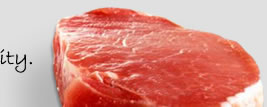
Do you need help deciding just which kind and type of beef to
buy that will complement your menu?
With all the different types of marbling, grades, and labels
of beef choices available, it can be confusing. For instance,
the right type of beef marbling can literally mean the difference
to the quality of the flavor. The type of quality beef grading
can determine what recipe and cooking method will work the best,
and the choice of Maturity Grading is a factor with budget considerations.
To help with some of these decisions, we have proved a concise
and informative illustration below courtesy of Cargill Sterling
Silver.
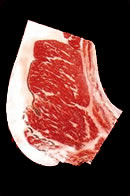 |
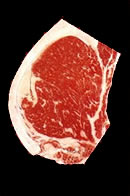 |
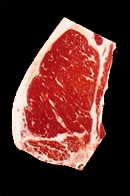 |
| Moderately
Abundant |
| •
The minimum marbling degree necessary for average
U.S. Prime |
|
| Slightly
Abundant |
| •
U.S. Prime must, at the minimum level, be representative
of Slightly Abundant. |
•
The minimum Marbling necessary to qualify for U.S.
Prime grade. |
|
| Moderate |
| •
The minimum marbling degree necessary for high U.S.
Choice. |
|
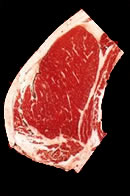 |
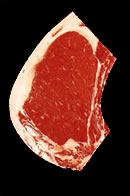 |
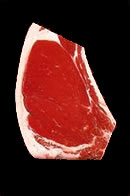 |
| Modest |
| •
The minimum marbling degree necessary for average
U.S. Choice |
|
| Small |
| •
U.S. Choice must, at the minimum level, be representative
of Small. |
•
The minimum marbling necessary to qualify for U.S.
Choice grade. |
|
| Slight |
| •
U.S. SELECT must, at the minimum level, be representative
of Slight. |
|
| |
|
|
| The above illustrations
are reduced reproductions of the Official USDA Marbling Photographs
prepared for the U.S. Department of Agriculture by and available
from the National Cattlemen's Beef Association. |
USDA GRADE LABELING DEFINITIONS
| Marbling
Score |
Quality
Grading |
Maturity Grade
{Increases from right to left} |
| |
|
A |
B |
C |
D |
E |
| Slightly
Abundant |
PRIME |
|
| Moderate |
CHOICE |
FINE
DINING |
| Modest |
CHOICE |
|
| Small |
CHOICE |
STANDARD
DINING |
| Slight |
SELECT |
|
| Traces |
STANDARD |
FORMULA
DINING |
| Practically
Devoid |
STANDARD |
INSTITUTIONS |
|
Marbling
Score – Those are the small flecks of fat that
develop within the meat to give beef that rich, mouth-watering
flavor we all crave. The more marbling the beef has, the
more quality of taste it will offer.
Quality Grading – Is based on a scale from the
absolute premier quality offered (Prime), to the least of
the cuts, such as with Standard.
Maturity Grading – Involves the age at the time
a beef animal is harvested. USDA Maturity Grades range from
"A" being the youngest to "E" being
the eldest age categories. (See additional information and
chart below)
As the quality grade declines from Prime into the Standard
grade levels the meat becomes less tender to the palate,
changes in color from bright red to a more burgundy dark
color, and the texture goes from a very fine to a more course
"grainy" condition. Beef that reaches the USDA
Grade of Standard, Commercial, and Utility are sometimes
made more palatable by mechanically tenderizing or injecting
with a solution to add flavor and/ or a tenderizing chemical.
|
The Cargill Sterling Silver Beef Program
is USDA Certified to only select those Beef Carcasses in the Prime
or Modest 0-Choice quality Grade, and only in the A & B category
of maturity grading that insures a fine dining experience each
and every time. Sterling Silver delivers not a "Good Steak"
but a "Great Steak" time after time.
Maturity – The age of a beef
animal has a direct effect on tenderness of the meat it produces.
As cattle mature, their meat becomes progressively tougher. To
account for the effects of the maturing process on beef tenderness,
evaluations of carcass maturity are used in determining USDA Quality
Grades. There are five maturity groupings, designated as A through
E below.
Approximate ages corresponding to each
maturity classification are:
• A - 9 to 30 Months
• B - 30 to 42 Months
• C - 42 to 72 Months
• D - 72 to 96 Months
• E - More Than 96 Months
Menu Selection – To achieve
an optimum balance between the issue of quality and cost on the
menu, we suggest purchasing the Prime to Modest Choice
to please your customer’s pallet the best. You will obtain
the most satisfactory results with these grades no matter if you
sauté, barbeque, flame broil, or oven baste.







